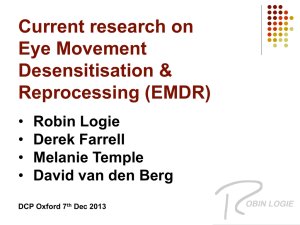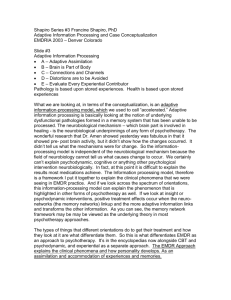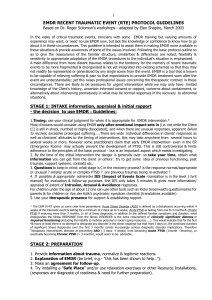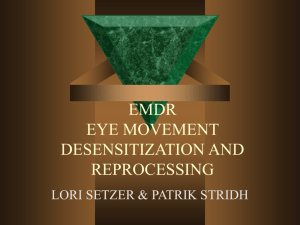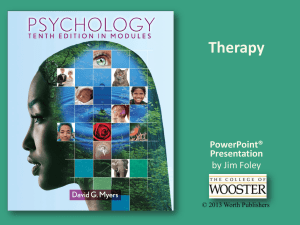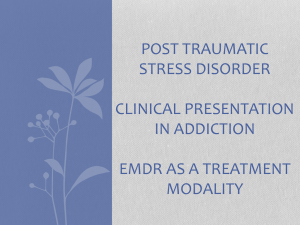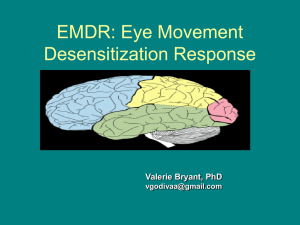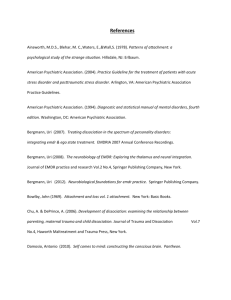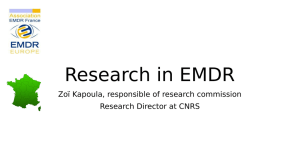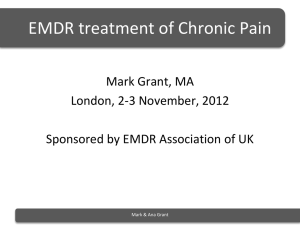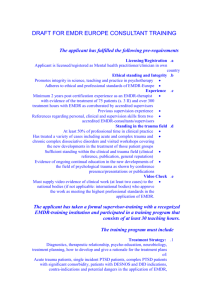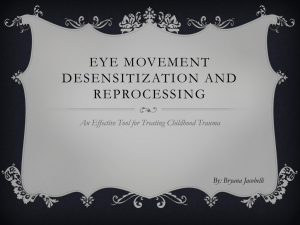What is EMDR - QC Counselor
advertisement
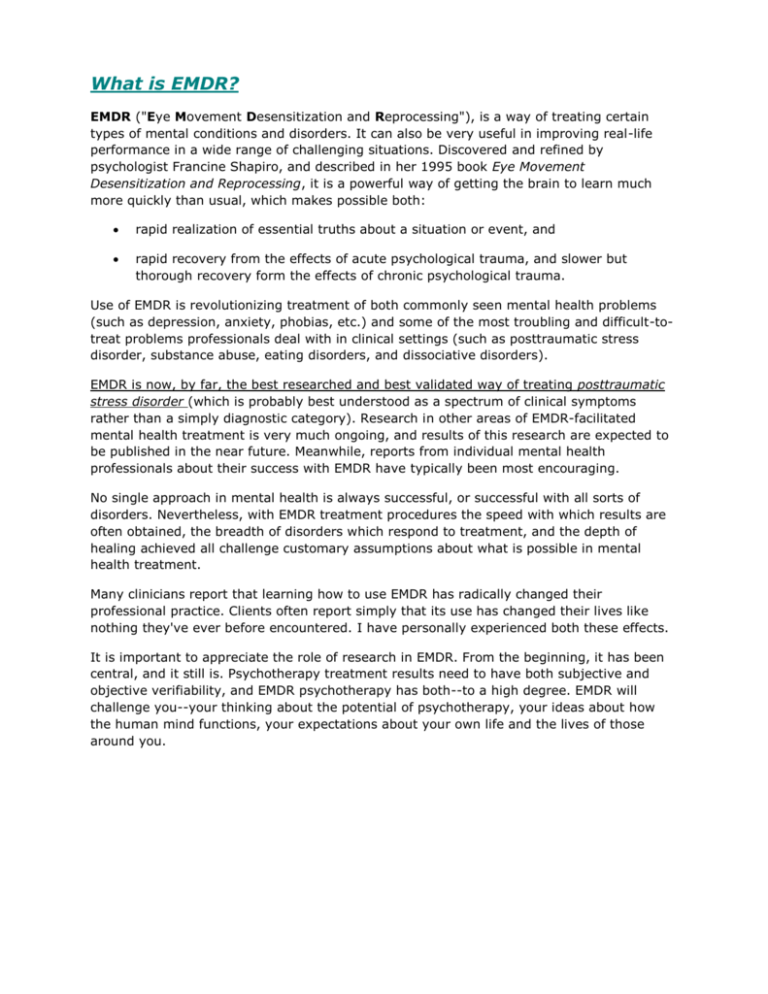
What is EMDR? EMDR ("Eye Movement Desensitization and Reprocessing"), is a way of treating certain types of mental conditions and disorders. It can also be very useful in improving real-life performance in a wide range of challenging situations. Discovered and refined by psychologist Francine Shapiro, and described in her 1995 book Eye Movement Desensitization and Reprocessing, it is a powerful way of getting the brain to learn much more quickly than usual, which makes possible both: rapid realization of essential truths about a situation or event, and rapid recovery from the effects of acute psychological trauma, and slower but thorough recovery form the effects of chronic psychological trauma. Use of EMDR is revolutionizing treatment of both commonly seen mental health problems (such as depression, anxiety, phobias, etc.) and some of the most troubling and difficult-totreat problems professionals deal with in clinical settings (such as posttraumatic stress disorder, substance abuse, eating disorders, and dissociative disorders). EMDR is now, by far, the best researched and best validated way of treating posttraumatic stress disorder (which is probably best understood as a spectrum of clinical symptoms rather than a simply diagnostic category). Research in other areas of EMDR-facilitated mental health treatment is very much ongoing, and results of this research are expected to be published in the near future. Meanwhile, reports from individual mental health professionals about their success with EMDR have typically been most encouraging. No single approach in mental health is always successful, or successful with all sorts of disorders. Nevertheless, with EMDR treatment procedures the speed with which results are often obtained, the breadth of disorders which respond to treatment, and the depth of healing achieved all challenge customary assumptions about what is possible in mental health treatment. Many clinicians report that learning how to use EMDR has radically changed their professional practice. Clients often report simply that its use has changed their lives like nothing they've ever before encountered. I have personally experienced both these effects. It is important to appreciate the role of research in EMDR. From the beginning, it has been central, and it still is. Psychotherapy treatment results need to have both subjective and objective verifiability, and EMDR psychotherapy has both--to a high degree. EMDR will challenge you--your thinking about the potential of psychotherapy, your ideas about how the human mind functions, your expectations about your own life and the lives of those around you. What can EMDR treat? Originally, EMDR was used to resolve the after-effects of psychological trauma--assaults, natural disasters, traumatic grief, and other acutely painful situations. It was seen to work with unusual speed, and to achieve a degree of relief that was uncommon, to say the least. In recent years, however, it has been seen that EMDR can do wonders with a wider range of psychological disturbances than had originally been thought. EMDR works with a wide range of problems. This surprising clinical finding, validated increasingly by research, is part of what is forcing us to change our thinking about mental health, as we work with EMDR in clinical settings. Put simply, we have found that a psychotherapy that seems focused on trauma-resolution actually helps with, and can heal, a wide range of problems not previously thought to be trauma-related, such as substance abuse disorders, a variety of kinds of depression, bi-polar disorder, some forms of schizophrenia, a wide range of anxiety disorders, and so on. Many times we cannot know if use of EMDR will help or not until we try it. Often it does. Our understanding of why this is so is currently inadequate. But this is not particularly a problem. There is very little that happens in psychotherapy that we can fully explain. It's simply far more important to understand that EMDR can help than it is to know why or how. Certain problems are now considered routine for EMDR psychotherapists, due the historical success they have had in dealing with these problems. Please realize that as with all professions, mental health professionals vary widely as to their skill, insight, experience, training, and success rates. With psychotherapists who use EMDR for a significant number of their clients, here are some of the routinely treated clinical problems with which they report considerable success: Posttraumatic stress disorder Acute stress disorder Generalized anxiety disorder Depression and depressed mood (subclinical depression) Acting-out problems in children and adolescents Sleep disorders, nightmares Other problems, usually considered specialty areas, have also been successfully treated by skilled EMDR psychotherapists, including: Phobias of many kinds Substance use and impulse control disorders of many kinds Paranoid schizophrenia Anger management problems Chronic pain management Bi-polar disorders Somatization disorders Dissociative disorders Personality disorders
